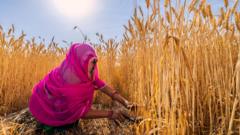India is grappling with unprecedented heatwaves, as confirmed by the Indian Meteorological Department, which recorded the hottest February in 125 years. This early onset of summer is disrupting traditional agricultural and manufacturing practices, with farmers and business owners adapting to the new reality.
Nitin Goel, a textiles manufacturer in Ludhiana, has seen drastic shifts in consumer behavior as winter clothing demand plummets. "We've had to pivot to t-shirts instead of sweaters," Goel explained. The changing climate has not only affected sales but also forced manufacturers to alter long-standing business models. Retail clients are increasingly hesitant to commit to orders as soaring temperatures linger, further complicating supply chains and threatening livelihoods.
The agricultural sector is equally affected, particularly in Devgad, known for its prized Alphonso mangoes. Farmer Vidyadhar Joshi reported that expected production could drop to only 30% of normal yields, attributing the decline to increased irrigation and fertilizer costs due to the oppressive heat.
Meanwhile, essential crops such as wheat and chickpeas are under threat, raising concerns about food security. Despite reassurances from the agriculture minister of a robust wheat harvest, experts warn of possible declines similar to those witnessed during last year's heatwaves, which curtailed yields by 15-25%.
Water scarcity exacerbates the situation, with northern reservoir levels shrinking to 28% of capacity, compared to 37% last year. This shortage may impact various agricultural sectors, including dairy, where milk production has already seen a decrease of up to 15%.
Economic implications are significant; experts fear the combination of rising food prices and delayed private investments could thwart India's economic recovery. The Council on Energy, Environment and Water (CeeW) emphasizes that urgent measures are needed for better weather forecasting, agricultural insurance, and climate-adaptive cropping calendars to mitigate these crises.
This stark reality is underscored by research predicting that by 2030, extreme heat could reduce India's daily working hours by 5.8%, posing a dire risk to productivity and national economic stability. With three out of four districts identified as "extreme event hotspots," the call for prompt action grows stronger. The future well-being of both lives and livelihoods in India hangs in the balance as climate change continues to unfold.


















